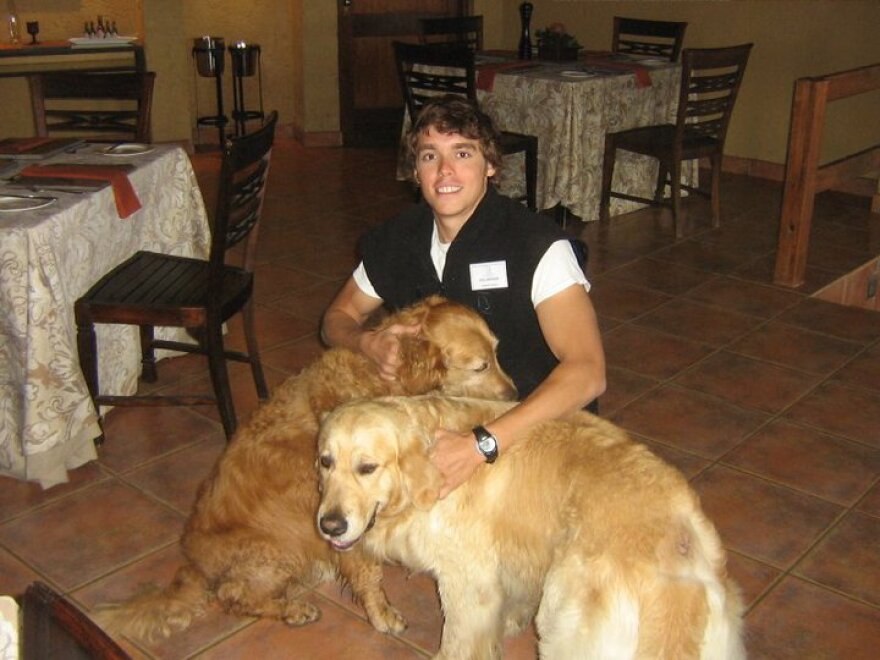In June 2012, Andrew Oberle, an aspiring primate researcher, was brutally attacked by two chimpanzees at a zoo in South Africa. The animals tore his flesh from head to toe and he nearly died.
But after 26 surgeries and extensive therapies at Saint Louis University Hospital, Oberle recovered. His ability to overcome his traumatic experiences led him to want to help others in who've experienced extreme physical injuries. Today, Oberle serves as the director of development for the Oberle Institute, a trauma care program at Saint Louis University that is supported by foudations. He helps raise funds for the institute and also serves as a patient advocate.
The Oberle Institute launched a pilot program over the summer and recently finished treating its first patient. St. Louis Public Radio’s Eli Chen spoke with Oberle about his physical trauma and what the Oberle Institute offers its patients.
Eli Chen: Andrew, talk to me about where you were and what you were doing when the chimps attacked you.
Andrew Oberle: I was in South Africa. I was doing my master's research. I was a graduate student at the University of Texas in San Antonio. So I went there to conduct some master's research on chimpanzee tool-use behavior. And one day, I was giving a tour and a couple of guys managed to get out of their enclosure. Something made them mad, not sure what happened. But they ended up tearing me to pieces.
Can you describe the extent of your injuries when they attacked you?
[I] lost a lot of my scalp, both of my ears and my nose. I have a nice gash on the side of my face that caused some paralysis on the right side. I lost most of my fingers, all except my ring finger on the left and both of my thumbs. Both of my wrists got torn up. I had a collapsed lung. A bunch of chunks ripped out of my back and my legs. Lost over half of my right foot and all the toes on my left foot.
Tell me about the care you received and the technology that helped you recover.
In South Africa, a lot of the care I received was to fight off infection. A lot of that care was really just to keep me alive and get me a little stronger so I could come home to St. Louis. But once I got to Saint Louis University, my awesome doctor, Bruce Kraemer, he's the chief of plastic surgery there and he did a lot of really cool things to help get me back up and running. Since my wrist was destroyed, I needed to have new tendon connections in there to help me move it.
They cut a flap into my belly and actually sewed that flap to my arm. I was stuck like that for three weeks. I was basically in a sutured skin sling, if you want to put it that way. That was probably the most miserable three weeks out of my entire recovery. Dr. Kraemer also uses a really cool product called Matristem. It's a powder derived from pig's bladder that when you pack it in a wound, what it does is it kind of fast tracks the healing process. Your body starts to like build over it as a scaffolding. And it also tells your body what kind of cell needs to go in that exact spot.
Listen to Andrew Oberle's story about his recovery.
Your recovery led you to work on a new trauma care program over at SLU. I'm wondering if you could tell me about the approach that the Oberle Insitute takes towards its patients.

We really look at trauma care as a holistic approach with the patient. It's not just patching up your wound and sending you out the way and then sending you out to the [physical therapist] and then sending you out to the [occupational therapist]. This is a team approach where we bring the awesome plastic surgery and reconstruction that Dr. Kraemer does in his team as well as all the different providers from physical therapy, occupational therapy.
We're also really focusing on emotional health and spiritual transformation. Going through something like this, you know, something so traumatic, your world is kind of crushed and shattered and you really have to start rebuilding and trying to make sense of what happened, so having counselors. One of the very first people that I talked to in South Africa was a counselor and he really helped me through a lot of things. But we also have my dog Angie who I've had for nine years now. She was super important throughout my recovery when I was at home. We have a dog therapy team on our team.
If I wouldn't have had so much help in getting me in the right frame of mind during my recovery, I'm certain it wouldn't have gone as well as it had. But I had that mental and emotional support from the very beginning, which allowed me to focus on the positive things and really focus on you know working hard in therapy and taking on those surgeries with confidence and not being afraid.
Follow Eli on Twitter: @StoriesByEli



